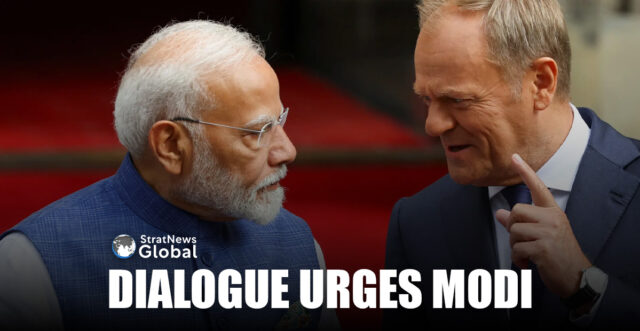Amid the ceremonials welcoming Prime Minister Modi in Warsaw on Thursday, a question: why has it taken 45 years for an Indian head of government to come here when Donald Tusk, as prime minister in 2010, made a state visit to India?
Was it because India tended to view Poland (even Eastern Europe) through the Russian lens? Or perhaps the preoccupation was elsewhere.
The Polish embassy has an explanation, attributing the weakening of relations in the 1990s to “transformation changes in Poland and economic reforms in India.”
Whatever the reason, Modi’s decision to visit Warsaw is an acknowledgement of Poland’s rising political and economic profile in the current situation brought on by the Ukraine war.
As the prime minister said, “India firmly believes that no issue can be solved on a battlefield. We support dialogue and diplomacy for the quick restoration of peace.”
As a country that suffered under the yoke of Communist Russia, Poland along with some other East European and Baltic nations, are among the strongest critics of Russia’s invasion of Ukraine.
“The pressure from Europe on India, on the issue of Ukraine, is partly brought on by countries like Poland and the Baltic states and we have stepped up our interaction with them in recent months,” says Nandan Unnikrishnan, head of Russia studies at the ORF.
Poland is also a rising economic force Europe with a healthy population by European standards, of around 30 million, noted a former senior diplomat well versed with the region. Collaboration in mining is a possibility, also in manufacturing given Poland’s fairly solid industrial base.
Collaboration in the military industrial domain is another possibility which Prime Minister Tusk alluded to during a media briefing.
“It is no coincidence that we talked about intensification in terms of the defence industry,” he said. “We are ready as Poland to take part in the modernisation of military equipment.”
Modernisation of India’s Soviet era T-72 tanks is one area the Poles maybe keen to get into. India has reopened its defence wing in the embassy in Warsaw, an indication it sees possibilities.
“Poland may not have platforms or highly sophisticated systems,” Unnikrishnan said, pointing out that “Russia gave us what we needed so we never looked at them but now they have stuff of their own, not in competition with Russia but vis a vis Europe at better prices.”
But given the paucity of information about Poland in this country, perhaps the government could get the CII and FICCI, both premier organisations representing Indian industry and business, to build relationships in Poland.
The focus now shifts to Ukraine with Modi embarking on a 10-hour journey by train to Kyiv. There seems little doubt this visit is largely about optics. A ceasefire or even talks towards a lasting peace may have to wait the election of the new US president.
Thirty eight years in journalism, widely travelled, history buff with a preference for Old Monk Rum. Current interest/focus spans China, Technology and Trade. Recent reads: Steven Colls Directorate S and Alexander Frater's Chasing the Monsoon. Netflix/Prime video junkie. Loves animal videos on Facebook. Reluctant tweeter.





